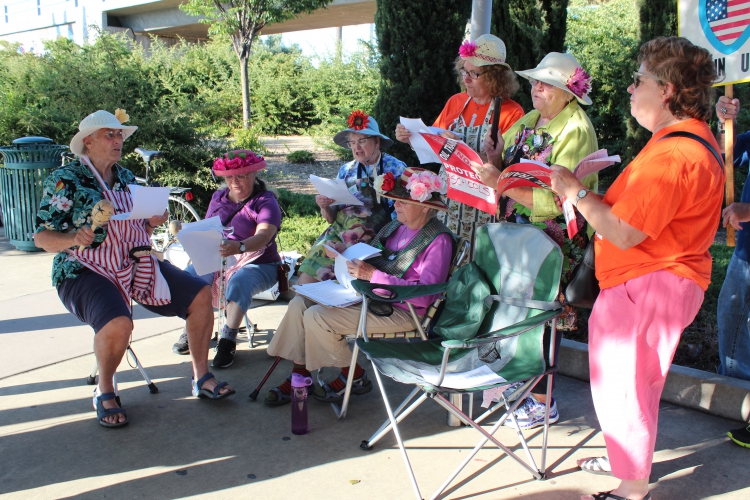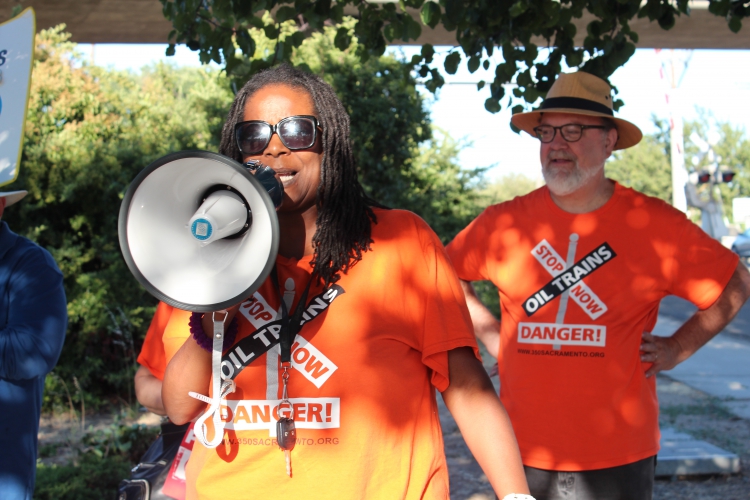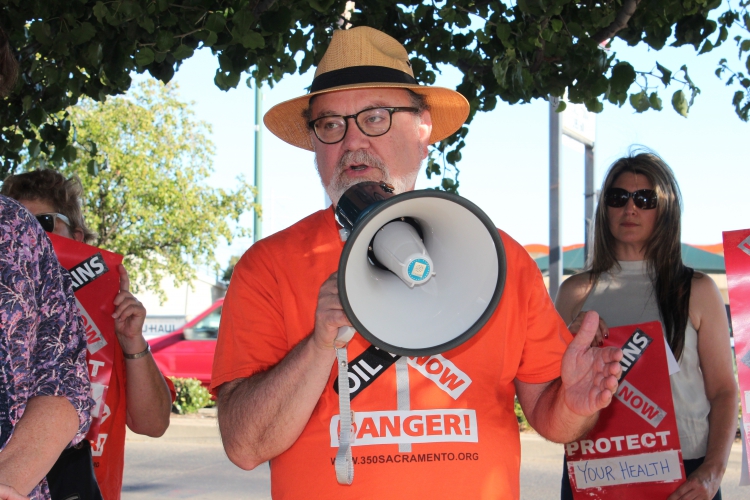From the Open-Publishing Calendar
From the Open-Publishing Newswire
Indybay Feature
Sacramento Activists Hold Vigil to Remember 47 Killed in Lac-Mégantic
“We can stop these oil trains if we organize and get people involved,” said Esteban Hernandez of the Sac Activist School. “We can win this battle.”
The Raging Grannnies sing their songs against fracking and oil trains at the vigil remembering the 47 people killed in Canada in the Lac-Mégantic Disaster on July 6, 2013. Photo by Dan Bacher.
The Raging Grannnies sing their songs against fracking and oil trains at the vigil remembering the 47 people killed in Canada in the Lac-Mégantic Disaster on July 6, 2013. Photo by Dan Bacher.
Sacramento Activists Hold Vigil to Remember 47 Killed in Lac-Mégantic
by Dan Bacher
On July 6, over 30 activists in Sacramento held a vigil memorializing the 47 people killed in Canada in the Lac-Mégantic Disaster three years ago.
They began the vigil at 6 p.m. at the Florin Light Rail station, located next to the track that leads to the Kern County oil refineries. After the Raging Grannies opened the event by singing songs opposing oil drilling and fracking, the Sacramento Oil Trains Coalition read the names of the people killed in Lac-Mégantic.
The vigil took place in the capital of the third biggest oil state in the nation, where the Western States Petroleum Association (WSPA) is headquartered. WSPA, the oil industry trade association for the Western states, is the largest and most powerful corporate lobby in Sacramento. Kern County produces the majority of oil obtained from fracking, acidizing and steam injection operations in California.
The Sacramento rally and vigil was one of over 40 actions the same week across the U.S. demanding a halt to plans to run these explosive “bomb trains,” carrying fracked Bakken crude oil from South Dakota, through cities.
"We do not want these dangerous oil trains rolling through the communities of Sacramento, but that is exactly what the oil industry wants - to bring 100 car-long trains though our city, near our schools, home and businesses more than a day," said Chris Brown, action coordinator.
The Sacramento Oil Trains Coalition, including 350 Sacramento, ANSWER, Sac Activist School, and STAND, organized the event.
Valerie Williams of the Coalition and Ellen Cochrane, Sacramento City Unified School Board Member, spoke at the event about the dangers of oil trains.
“I was amazed when I first found out that there would be oil trains coming right through our backyard,” said Valerie Williams, a South Sacramento homeowner and student at California State University Sacramento (CSUS). “This is not only where we live, but it’s where we go to school and go to work. Our kids are already exposed to too much air pollution from toxic emissions; oil trains are the last thing we need here.”
Over 13,000 students in 17 schools are located in the blast zones of the oil trains, according to Williams. She noted that both Sacramento City College and CSUS are located within the blast zones.
Railroad cars filled with crude oil have been moving through Sacramento over the past several years as they head south to a transfer stations outside Bakersfield and west to refineries in Richmond. Williams said her husband had recently witnessed a train with 30 cars carrying crude oil move through Sacramento.
The Valero Refining Company, a subsidiary of the San Antonio-based Valero Energy Corporation, has applied to run two trains daily through Sacramento to its plant in Benicia. The Benicia City Planning Commission rejected Valero’s request this February, but the company has appealed the decision.
Forty-seven people died when a 74-car train carrying Bakken Formation crude oil derailed and destroyed a Canadian town, Lac-Mégantic in Quebec, three years ago. All but three of the 39 remaining downtown buildings are to be demolished due to petroleum contamination, according to Brown.
“Bakken crude, a fracked oil from South Dakota, is very volatile,” said Brown. “Derailments have led to massive explosions - more than 15 in the past two years, including one in the Columbia River Gorge at the beginning of June.”
Both the oil industry and Union Pacific claim that the oil trains are safe. Justin Jacobs, a spokesperson for Union Pacific, told Fox 40 News, "Our safety and statistics specifically with crude oil has a 99.9% of the time making it from its origination to its destination without incident.” (fox40.com/...)
However, activists cite the disasters in Lac-Mégantic, the Columbia River Gorge and elsewhere as evidence that allowing the oil trains to pass through Sacramento and other communities is an unacceptable risk — and they vowed to keep fighting to stop these trains.
“With backyards right next to the tracks, communities such as South Sacramento have some of the highest asthma rates in the region, from train engine fumes, and are now being subjected to this unjust risk,” said Brown.
“We can stop these oil trains if we organize and get people involved,” said Esteban Hernandez of the Sac Activist School. “We can win this battle.”
CA Air Resources Board stalls tropical forest offsets in Cap-and-Trade
Governor Jerry Brown, while portraying himself as a “climate leader” at climate conferences and other photo opportunities across the globe, is a big supporter of the expansion of fracking for crude oil, the same type of highly explosive oil that the “bomb trains” are transporting. He is also a big promoter of widely-contested carbon trading and REDD (Reducing Emissions from Deforestation and Forest Degradation) programs.
Indigenous and grassroots environmental and anti-corporate organizations throughout the world strongly oppose these “permits to pollute” and REDD (Reducing Emissions from Deforestation and Forest Degradation) programs that drive Governor Brown’s “climate change” and “green energy” policies.
On July 14, global climate justice advocates who await the California Air Resources Board’s proposed amendments to the state’s Cap-and-Trade program found out that they will have to keep waiting.
"These amendments will clarify if, and how, California intends to include tropical forest-based carbon credits, also known as REDD offset credits in the Cap-and-Trade carbon pollution program," according to a statement from the Friends of the Earth. "This week the Air Resources Board released the proposed amendments to Cap-and-Trade, and announced that REDD rulemaking will not happen at this time."
The group said that in the package released this week, Air Resources Board staff stated that they will continue to seek input on their future proposed REDD program; "they also made clear that they hope to link California’s carbon market with the Brazilian State of Acre – a linkage that would bring international forest carbon credits into the California market for the first time – but that this linkage will not be undertaken at this time."
in response to the announcement, Gary Graham Hughes, Friends of the Earth’s California advocacy campaigner, said, "California’s decision to temporarily keep REDD out of the California carbon casino puts an important, though momentary, halt to this environmentally dubious, economically inequitable, and socially unjust climate policy. If California wants to take action on forests to address the dangers of climate change, there is no better place to begin than in this state’s globally relevant forests. California must begin to remove pollution trading from its climate policy mix."
"As an organization, Friends of the Earth has principled and scientific reasons for opposing California’s Cap-and-Trade program as an unjust and inadequate climate change mitigation tool. Friends of the Earth will continue to challenge the inadequacies of Cap-and-Trade pollution trading, while supporting the positive regulatory advances in California that are slowly moving the state away from dirty energy and towards a just transition for future generations," he concluded.
Meanwhile, oil industry leaders, led by Catherine Reheis-Boyd, the President of the Western States Petroleum Association (WSPA), are currently talking with Brown administration officials In “hopes of reaching a consensus on extending California landmark climate change programs, according to LA Times reporters Chris Megerian and Melanie Mason. (http://touch.latimes.com/#section/-1/article/p2p-87785075/)
Reheis-Boyd, the former chair of the controversial Marine Life Protection Act (MLPA) Initiative Blue Ribbon Task Force to create so-called “marine protected areas” in Southern California, told the Los Angeles Times that the industry is engaged in “ongoing talks with the administration to improve the state’s current climate change programs.”
The oil industry, including WSPA, Chevron, Phillips 66, AERA Energy, Exxon and Shell, have spent more than $25 million so far in the 2015-16 legislative session. The Western States Petroleum Association alone has spent $12.8 million so far in the session, making them, as usual, the top California lobbying spenders of the session. (http://www.oaklandmagazine.com/Big-Oil-Spends-Big-Money/)
by Dan Bacher
On July 6, over 30 activists in Sacramento held a vigil memorializing the 47 people killed in Canada in the Lac-Mégantic Disaster three years ago.
They began the vigil at 6 p.m. at the Florin Light Rail station, located next to the track that leads to the Kern County oil refineries. After the Raging Grannies opened the event by singing songs opposing oil drilling and fracking, the Sacramento Oil Trains Coalition read the names of the people killed in Lac-Mégantic.
The vigil took place in the capital of the third biggest oil state in the nation, where the Western States Petroleum Association (WSPA) is headquartered. WSPA, the oil industry trade association for the Western states, is the largest and most powerful corporate lobby in Sacramento. Kern County produces the majority of oil obtained from fracking, acidizing and steam injection operations in California.
The Sacramento rally and vigil was one of over 40 actions the same week across the U.S. demanding a halt to plans to run these explosive “bomb trains,” carrying fracked Bakken crude oil from South Dakota, through cities.
"We do not want these dangerous oil trains rolling through the communities of Sacramento, but that is exactly what the oil industry wants - to bring 100 car-long trains though our city, near our schools, home and businesses more than a day," said Chris Brown, action coordinator.
The Sacramento Oil Trains Coalition, including 350 Sacramento, ANSWER, Sac Activist School, and STAND, organized the event.
Valerie Williams of the Coalition and Ellen Cochrane, Sacramento City Unified School Board Member, spoke at the event about the dangers of oil trains.
“I was amazed when I first found out that there would be oil trains coming right through our backyard,” said Valerie Williams, a South Sacramento homeowner and student at California State University Sacramento (CSUS). “This is not only where we live, but it’s where we go to school and go to work. Our kids are already exposed to too much air pollution from toxic emissions; oil trains are the last thing we need here.”
Over 13,000 students in 17 schools are located in the blast zones of the oil trains, according to Williams. She noted that both Sacramento City College and CSUS are located within the blast zones.
Railroad cars filled with crude oil have been moving through Sacramento over the past several years as they head south to a transfer stations outside Bakersfield and west to refineries in Richmond. Williams said her husband had recently witnessed a train with 30 cars carrying crude oil move through Sacramento.
The Valero Refining Company, a subsidiary of the San Antonio-based Valero Energy Corporation, has applied to run two trains daily through Sacramento to its plant in Benicia. The Benicia City Planning Commission rejected Valero’s request this February, but the company has appealed the decision.
Forty-seven people died when a 74-car train carrying Bakken Formation crude oil derailed and destroyed a Canadian town, Lac-Mégantic in Quebec, three years ago. All but three of the 39 remaining downtown buildings are to be demolished due to petroleum contamination, according to Brown.
“Bakken crude, a fracked oil from South Dakota, is very volatile,” said Brown. “Derailments have led to massive explosions - more than 15 in the past two years, including one in the Columbia River Gorge at the beginning of June.”
Both the oil industry and Union Pacific claim that the oil trains are safe. Justin Jacobs, a spokesperson for Union Pacific, told Fox 40 News, "Our safety and statistics specifically with crude oil has a 99.9% of the time making it from its origination to its destination without incident.” (fox40.com/...)
However, activists cite the disasters in Lac-Mégantic, the Columbia River Gorge and elsewhere as evidence that allowing the oil trains to pass through Sacramento and other communities is an unacceptable risk — and they vowed to keep fighting to stop these trains.
“With backyards right next to the tracks, communities such as South Sacramento have some of the highest asthma rates in the region, from train engine fumes, and are now being subjected to this unjust risk,” said Brown.
“We can stop these oil trains if we organize and get people involved,” said Esteban Hernandez of the Sac Activist School. “We can win this battle.”
CA Air Resources Board stalls tropical forest offsets in Cap-and-Trade
Governor Jerry Brown, while portraying himself as a “climate leader” at climate conferences and other photo opportunities across the globe, is a big supporter of the expansion of fracking for crude oil, the same type of highly explosive oil that the “bomb trains” are transporting. He is also a big promoter of widely-contested carbon trading and REDD (Reducing Emissions from Deforestation and Forest Degradation) programs.
Indigenous and grassroots environmental and anti-corporate organizations throughout the world strongly oppose these “permits to pollute” and REDD (Reducing Emissions from Deforestation and Forest Degradation) programs that drive Governor Brown’s “climate change” and “green energy” policies.
On July 14, global climate justice advocates who await the California Air Resources Board’s proposed amendments to the state’s Cap-and-Trade program found out that they will have to keep waiting.
"These amendments will clarify if, and how, California intends to include tropical forest-based carbon credits, also known as REDD offset credits in the Cap-and-Trade carbon pollution program," according to a statement from the Friends of the Earth. "This week the Air Resources Board released the proposed amendments to Cap-and-Trade, and announced that REDD rulemaking will not happen at this time."
The group said that in the package released this week, Air Resources Board staff stated that they will continue to seek input on their future proposed REDD program; "they also made clear that they hope to link California’s carbon market with the Brazilian State of Acre – a linkage that would bring international forest carbon credits into the California market for the first time – but that this linkage will not be undertaken at this time."
in response to the announcement, Gary Graham Hughes, Friends of the Earth’s California advocacy campaigner, said, "California’s decision to temporarily keep REDD out of the California carbon casino puts an important, though momentary, halt to this environmentally dubious, economically inequitable, and socially unjust climate policy. If California wants to take action on forests to address the dangers of climate change, there is no better place to begin than in this state’s globally relevant forests. California must begin to remove pollution trading from its climate policy mix."
"As an organization, Friends of the Earth has principled and scientific reasons for opposing California’s Cap-and-Trade program as an unjust and inadequate climate change mitigation tool. Friends of the Earth will continue to challenge the inadequacies of Cap-and-Trade pollution trading, while supporting the positive regulatory advances in California that are slowly moving the state away from dirty energy and towards a just transition for future generations," he concluded.
Meanwhile, oil industry leaders, led by Catherine Reheis-Boyd, the President of the Western States Petroleum Association (WSPA), are currently talking with Brown administration officials In “hopes of reaching a consensus on extending California landmark climate change programs, according to LA Times reporters Chris Megerian and Melanie Mason. (http://touch.latimes.com/#section/-1/article/p2p-87785075/)
Reheis-Boyd, the former chair of the controversial Marine Life Protection Act (MLPA) Initiative Blue Ribbon Task Force to create so-called “marine protected areas” in Southern California, told the Los Angeles Times that the industry is engaged in “ongoing talks with the administration to improve the state’s current climate change programs.”
The oil industry, including WSPA, Chevron, Phillips 66, AERA Energy, Exxon and Shell, have spent more than $25 million so far in the 2015-16 legislative session. The Western States Petroleum Association alone has spent $12.8 million so far in the session, making them, as usual, the top California lobbying spenders of the session. (http://www.oaklandmagazine.com/Big-Oil-Spends-Big-Money/)
Add Your Comments
Latest Comments
Listed below are the latest comments about this post.
These comments are submitted anonymously by website visitors.
TITLE
AUTHOR
DATE
Correction
Sun, Aug 28, 2016 6:54PM
Oil trains can safely carry crude Oil is a 'Big Lie' of the Oil Monopolies.
Sat, Jul 23, 2016 1:54PM
We are 100% volunteer and depend on your participation to sustain our efforts!
Get Involved
If you'd like to help with maintaining or developing the website, contact us.
Publish
Publish your stories and upcoming events on Indybay.
Topics
More
Search Indybay's Archives
Advanced Search
►
▼
IMC Network






